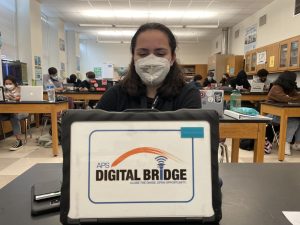Personal computers allow students to bypass Chromebook frustrations
February 7, 2022
At the beginning of this school year, Atlanta Public Schools provided every Midtown student with a Chromebook. These laptops were meant to revolutionize students’ learning and bring classrooms into the 21st century. That ideal has not succeeded.
On a school Chromebook, it can take up to 15 minutes to log on, connect to WiFi and pull up a website. Every time a student closes a school laptop, no matter how briefly, it completely logs them out of their computer. This requires the student to re-login and open all of their tabs again, wasting precious class time.
Despite the technological frustrations associated with school computers, many teachers at Midtown require students to use their Chromebooks and don’t allow the use of personal computers. Banning personal computers does enforce a level technological playing field for students, and ensures that no student has an unfair advantage due to their use of more updated technology. Furthermore, requiring school computers helps to prevent cheating, as teachers can view, in real-time, what is happening in students’ browsers by using the software Securly.
However, on days that students aren’t taking assessments, there is no reason to ban them from using personal computers. By forcing students to use their Chromebooks, teachers are ultimately slowing students down and preventing them from using resources that may help them do better.
School Chromebooks are often so encumbered by web restrictions that they are unusable for many academic activities, particularly research. Even some websites run by APS, such as the website of the APS Office of Student Assignments and Records, are inaccessible on school computers.
School-provided laptops are also incredibly clunky. With its protective case (that students aren’t allowed to take off) the laptop weighs roughly 4 pounds. That’s equivalent to carrying five cans of soup around Midtown all day.
Furthermore, students have limited access to images on their Chromebooks while on school WiFi. If students have a presentation or collage to make for class, they aren’t able to fully complete the assignment, often costing them points when these assignments are being graded. In addition, YouTube videos remain inaccessible to students on their school computers, even though many teachers integrate videos into their lesson plans.
Banning personal computers also hinders students from taking part in extracurriculars. For example, students who participate in programs like Robotics are not able to download and run crucial software on their school computers. Yearbook staffers use a specific website, Yearbook Avenue, to create the yearbook. On Chromebooks, the website is slow and unusable.
In order to bypass these restrictions and increase their productivity, many students bring and use their personal computers at school. It’s faster and more convenient to use a computer that they know is reliable and won’t falter while performing simple tasks.
If students are already carrying around their personal computer, either for the sake of productivity or for an extracurricular, why shouldn’t they be allowed to use them for non-assessment assignments? Ultimately, banning personal computers hampers students who are trying to be more productive and engaged members of the Midtown community.







